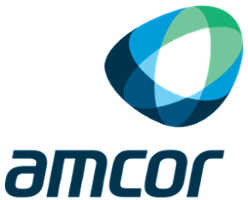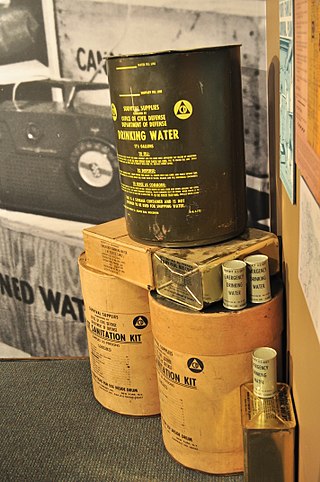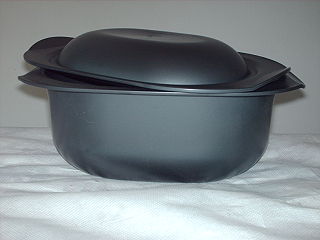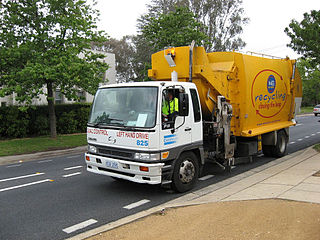
A drink can is a metal container designed to hold a fixed portion of liquid such as carbonated soft drinks, alcoholic drinks, fruit juices, teas, herbal teas, energy drinks, etc. Drink cans are made of aluminum or tin-plated steel. Worldwide production for all drink cans is approximately 370 billion cans per year.

Aluminium foil is aluminium prepared in thin metal leaves. The foil is pliable and can be readily bent or wrapped around objects. Thin foils are fragile and are sometimes laminated with other materials such as plastics or paper to make them stronger and more useful.

An aluminum can is a single-use container for packaging made primarily of aluminum. It is commonly used for food and beverages such as olives and soup but also for products such as oil, chemicals, and other liquids. Global production is 180 billion annually and constitutes the largest single use of aluminum globally.

A steel can, tin can, tin, or can is a container made of thin metal, for distribution or storage of goods. Some cans are opened by removing the top panel with a can opener or other tool; others have covers removable by hand without a tool. Cans can store a broad variety of contents: food, beverages, oil, chemicals, etc. In a broad sense, any metal container is sometimes called a "tin can", even if it is made, for example, of aluminium.

A lunch box refers to a hand-held container used to transport food, usually to work or to school. It is commonly made of metal or plastic, is reasonably airtight and often has a handle for carrying.
Thermoforming is a manufacturing process where a plastic sheet is heated to a pliable forming temperature, formed to a specific shape in a mold, and trimmed to create a usable product. The sheet, or "film" when referring to thinner gauges and certain material types, is heated in an oven to a high-enough temperature that permits it to be stretched into or onto a mold and cooled to a finished shape. Its simplified version is vacuum forming.

Amcor plc is a global packaging company. It develops and produces flexible packaging, rigid containers, specialty cartons, closures and services for food, beverage, pharmaceutical, medical-device, home and personal-care, and other products.

A closure is a device used to close or seal a container such as a bottle, jug, jar, tube, or can. A closure may be a cap, cover, lid, plug, liner, or the like. The part of the container to which the closure is applied is called the finish.

Biscuit tins are utilitarian or decorative containers used to package and sell biscuits and some confectionery. Invented by Huntley & Palmers in 1831, they are commonly found in households in Great Britain, Ireland, and Commonwealth countries, but also in continental Europe and French Canada. Popularity in the United States and English Canada spread later in the 20th century. Over 60% of UK households own a biscuit tin.
AMAG is the biggest company in the Austrian Aluminium industry sector. It is situated in the village of Ranshofen, which is in Braunau am Inn.

Ball Corporation is an American company headquartered in Westminster, Colorado. It is best known for its early production of glass jars, lids, and related products used for home canning. Since its founding in Buffalo, New York, in 1880, when it was known as the Wooden Jacket Can Company, the Ball company has expanded and diversified into other business ventures, including aerospace technology. It eventually became the world's largest manufacturer of recyclable metal beverage and food containers.

Novar plc was an international building supplies group based in the United Kingdom. Novar was formed in 1921 as Metal Box Company from the coming together of several businesses and trades, including canning and printing. By the 1970s, it was a market leader in these fields. In the 1980s the company diversified into building supplies and at its peak consisted of 30 companies supplying products to the construction and DIY industries.

Canned water is drinking water, including spring water, artesian spring water, purified water, carbonated water and mineral water, packaged in beverage cans made of aluminium or tin-plated steel.
Anomatic Corporation manufactures aluminum products, and is a manufacturer of large-quantity aluminum parts for cosmetic companies' packaging including Revlon, Maybelline, Estee Lauder and Mary Kay.
Constellium SE is a Paris-based global manufacturer of aluminium rolled products, extruded products, and structural parts based on a large variety of advanced alloys. Constellium's C-TEC research center has been credited for advancing technology in the field of advanced aluminium alloy. Constellium primarily serves the aerospace, automotive, and packaging sectors. Large clients include Mercedes-Benz, Audi, BMW, Fiat Chrysler Automotive, Ford, Airbus, Boeing, and Bombardier.

The term cosmetic packaging is used for containers and secondary packaging of fragrances and cosmetic products. Cosmetic products are substances intended for human cleansing, beautifying and promoting an enhanced appearance without altering the body's structure or functions.

Plastic containers are containers made exclusively or partially of plastic. Plastic containers are ubiquitous either as single-use or reuseable/durable plastic cups, plastic bottles, plastic bags, foam food containers, Tupperware, plastic tubes, clamshells, cosmetic containers, up to intermediate bulk containers and various types of containers made of corrugated plastic. The entire packaging industry heavily depends on plastic containers or containers with some plastic content, besides paperboard and other materials. Food storage nowadays relies mainly on plastic food storage containers.

Recycling in Australia is a widespread, and comprehensive part of waste management in Australia, with 60% of all waste collected being recycled. Recycling is collected from households, commercial businesses, industries and construction. Despite its prominence, household recycling makes up only a small part (13%) of Australia's total recycling. It generally occurs through kerbside recycling collections such as the commingled recycling bin and food/garden organics recycling bin, drop-off and take-back programs, and various other schemes. Collection and management of household recycling typically falls to local councils, with private contractors collecting commercial, industrial and construction recycling. In addition to local council regulations, legislation and overarching policies are implemented and managed by the state and federal governments.
PT Alumindo Light Metal Industry Tbk, or also known simply as Alumindo, is the largest flat rolled aluminium manufacturer in South East Asia, and a publicly-traded subsidiary of Maspion which was founded in 1978 and started to become a commercial company in 1983. The company is headquartered in Surabaya, East Java. Initially, each year the company was able to produce around 4,800 tons of aluminum sheet which is usually used as the main ingredient in the manufacture of household appliances, transportation equipment, as well as building materials. Alumindo also produces 12 thousand tons of tin sheet which is the main ingredient in the packaging industry.

In Germany and Austria, the term yellow bag refers to a thin, yellowish transparent plastic bag, in which, in the context of local waste disposal, any waste made of plastic, metal or composite materials can be handed in. Depending on the agreement with the cities and municipalities, it may also be possible to use a 'yellow bin'. Yellow bags or yellow bins are part of the Dual System in the German waste management industry.


















